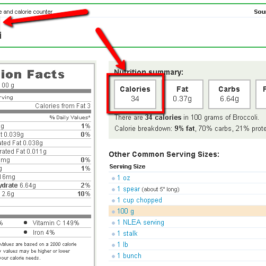- How Much Weight Can You Realistically Lose in 3 Months? - January 14, 2024
- How To Lose 1kg a Week (Guaranteed) - August 20, 2023
- How To Count Calories (or Estimate) and Stay on Track When Eating Out at Restaurants - July 25, 2023
TL;DR Glucose disposal agents are just another in a long line of expensive, over-hyped supplements that won’t actually help you in any way
The idea behind Glucose Disposal agents is that they ‘push’ glucose into muscle cells (to be stored as glycogen) instead of fat cells.
There are several problems with this, but before we get started, let’s have a quick lesson on Glucose and Glycogen.
How the Body Utilises and Stores Energy
Most of the food we eat is converted into Glucose – but not all. For example, fibre (found in Fruit and Vegetables) isn’t digestible so won’t be converted to Glucose.
Sidenote – this is why the ‘good carbs/bad carbs’ debate is redundant – most of the carbs we eat are converted into Glucose anyway, regardless of whether they are in the form of sugar when we eat them.
Glucose is then either used immediately to provide energy, stored as glycogen in the liver or the muscles, or stored in fat cells.
The Liver can also convert glycogen back into glucose to be used for energy as and when the body needs it.
The liver can store around 100g of glucose, the muscles can store around 400g and there’s around 4g circulating in the bloodstream at any one time [1]
These stores (liver and muscle) will be constantly depleted and replenished depending on how much you’ve eaten and how much activity you’re doing that requires glucose for fuel.
Once the liver and muscle glucose stores are full, any excess glucose will be stored as fat [2].
Muscle Building and Glycogen
Carbs are important for muscle growth for a number of reasons.
First of all, Carbs will be the most efficient fuel source for body builiding-style workouts (45-90 minutes at medium intensity), and are therefore essential for training with the sort of intensity and duration required to build muscle.
Carbs essentially provide the fuel required to have sufficiently intense workouts, so indirectly, they are essential for building muscle.
As previously mentioned Carbs can also be stored within the muscle cells as glycogen – when the muscles are full of glycogen, they will look and feel bigger; which can be motivating – who doesn’t love a pump at the gym.
The fact remains that this muscle glycogen is NOT muscle tissue, so while it can make the muscles appear bigger, if that glycogen is depleted, the muscles will look and feel smaller.
This means that any claims made about GDAs aiding muscle growth are unfounded; the body will shuttle glucose into muscle cells up to a point and even if GDAs did speed up this process, it would have any impact on how much muscle you could build. Or how quickly you could build that muscle.
Fat Loss and Glycogen
Fat loss or weight loss occurs when the body is in a calorie deficit, i.e. when the body is provided with fewer calories than it needs to main its current weight, regardless of whether those calories come from carbs, fat or protein.
Regardless of how glycogen is supposedly distributed in a different way with the use of GDAs – in the absence of a calorie deficit, you won’t lose fat, so GDAs are totally unnecessary for fat loss.
So, Are GDAs Worth It?
In my opinion, absolutely not.
The body is adept at controlling glucose uptake (unless you’re diabetic), and whether that glucose goes to the liver, muscles or into the bloodstream in the form of blood sugars.
The liver and the muscles will fill up with glycogen before it starts being stored as fat, and there’s a limit to how much the liver and muscles can store. GDAs won’t increase that limit, so I personally can’t see any justification for their use.
What Should you Do Instead?
Why do you want to take GDAs?
If the aim is to keep muscle glycogen topped up as much as possible, then being vigilant about your carbohydrate intake will take care of that.
Given that muscles can store roughly 400g of carbohydrates at any one time, if you can ensure that you’re hitting that as a daily target, whilst eating the right amount of overall calories to hit your weight then you can be confident that your muscle glycogen will be constantly topped out.






Leave a Reply